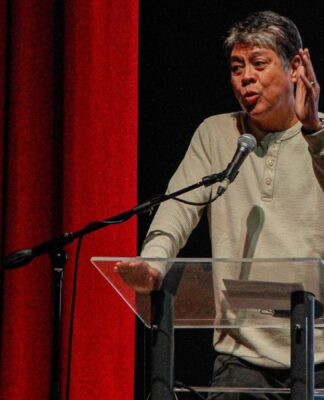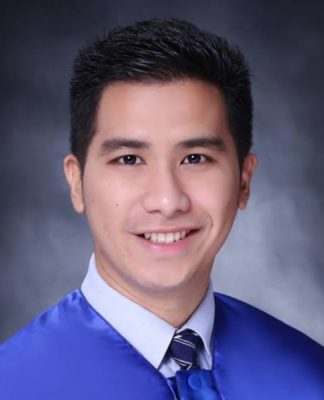 BY UNCOVERING one of a cell’s basic mechanisms, humanity is saved from the perils of cancer.
BY UNCOVERING one of a cell’s basic mechanisms, humanity is saved from the perils of cancer.
This was how a Nobel laureate described his unique way to attain world peace in a speech during the second installment of the International Peace Foundation’s (IPF) Bridges: Dialogues Towards a Culture of Peace last April 7 at the UST Continuing Medical Education Auditorium.
Prof. Aaron Ciechanover, a 2004 Nobel Laureate for Chemistry, stressed the significance of doing something constructive for the good of the people like having the initiative to discover treatments to society’s ailments rather than creating obstacles to hinder peace and progress.
“The idea is to do good. To go into the footsteps of creation and nature is a path I chose to take, which motivated me to study on something that will help the society,” said Ciechanover. “We are living in a society which is very frail, fragile, and susceptible to lots of diseases, hatred, wars, and terrorism, so we should focus and take these as God’s challenge to be solved.”
With his study on protein degradation – the breaking down of the human body’s complex molecules into simpler ones – the treatment of diseases with high mortality rates such as cancer and Alzheimer’s disease have become close to a possibility.
Ciechanover’s study never sought to discover drugs that can cure, but as he realized the effectiveness of his work, it further aimed to direct the society’s attention on possible discoveries of treatment procedures used in fighting diseases which are thought to be untreatable.
Uwe Morawetz, founding chairman and president of the IPF, said the Bridges forum seeks to help people from different cultures to better communicate with one another through various learning inputs.
“Peace and dialogue are both processes that need time. The first step towards peace is dialogue, and the first step towards dialogue is respect,” he said.
Morawetz says that since education is the primary concern of the IPF in building “bridges” between cultures, Ciechanover became one of the Nobel laureates invited to promote peace by enlightening students and professionals in different universities around the country through his study.
Last January 10, the University hosted a dinner for the first installment of Bridges with another Nobel laureate, Prof. David Jonathan Gross as guest speaker.
Ciechanover, alongside Avram Hershko and Irwin Rose, received the 2004 Nobel Prize for Chemistry for their discovery of ubiquitin-mediated protein degradation, which uses the molecule ubiquitin as a marker to hasten protein degradation. Ciechanover explained that in the past decades, scientists were only focused on explaining how proteins in the human body were produced, which motivated him and his companions to study how these complex materials are destroyed for the benefit of the human body’s survival.
Ciechanover’s discovery led to the identification of the modern process of cell cycle, growth, development, modulation, differentiation, repair, maintenance, and mutation, which are useful in the pathogenesis of many modern diseases such as an array of malignancies and neurodegenerative disorders. This led to the development of Velcade (Bortezomib), a drug proven to combat multiple myeloma, a cancer of plasma cells located in the bone marrow, which functions to inhibit ubiquitin and treat malignancies.
Narrating his experience as a native of Israel, where he experienced extreme violence, Ciechanover said that his constant exposure to wars in his country is one of the factors that drove him to accept the IPF’s project of promoting peace by expanding scientific knowledge in developing countries and diverting people’s minds from war to education.
“We are living on one small place called the world, so we must help rather than fight one another,” said Ciechnover, adding that people should be “part of the solution and not the problem.”
The “quack” doctor
Ciechanover began his talk, titled Life and death: Why Proteins Have to Die so We Shall Live, with a narration of the events in his career which ultimately led to his discovery of ubiquitin-mediated protein degradation.

Ciechanover finished his Master in Science and Doctor of Medicine degree at the Hadassah Medical School of the Hebrew University in Israel before joining the army to fulfill the three-year mandatory national service for Israelis. After being discharged from military service, Ciechanover decided to become a scientist, instead of curing patients as a medical doctor.
“When I was in medical school, I took a year off to do research because I was starting to feel bored by clinical medicine. The imbalance between phenomenology and pathogenic mechanisms of diseases and the lack of any mechanism-based treatments made me think that I was on the wrong trail,” he said.
Ciechanover then took up his doctorate in medicine and graduated in 1981 from the Israel Institute of Technology. There, he became a distinguished research professor at the Center for Cancer and Vascular Biology and director of the Rappaport Family Institute for Research in Medical Sciences.
According to Ciechanover, the human body destroys and renews denatured proteins regularly for two reasons. The first one is that proteins get denatured when they grow old. Proteins tend to fuse and alter normal body responses which the human body must get rid of.
“We can associate these denatured proteins with a milk or raw meat exposed to a high temperature,” said Ciechanover. In protein denaturation, the proteins are precipitated, coagulated and are broken down to specific amino acids which may result in the disruption of cell activity and cell death.
The second reason is to eliminate good but excess proteins taken up by the body. Ciechanover revealed that like other substances in the body such as sugar, fat, and hormones, proteins should always be maintained in the normal level. Anything which exceeds or does not meet the parameter is indicative of a disease.
One illness associated with accumulation of ‘garbage’ proteins is Alzheimer’s disease, a degenerative and terminal disease that causes dementia with no known cure, afflicting more than 24 million people in the world. On the other hand, decreased and increased protein degradation, according to Ciechanover, is associated with different cancer and tumor-related problems.
Protein resurrection
Ciechanover’s work is titled “Kiss of Death” due to its process controlled in detail, in which the proteins to be degraded are tagged with ubiquitin. It accompanies the protein to the proteasome, the site for protein breakdown and dissociates it from the protein for re-use.
For now, the available cancer treatments consist only of irradiation and chemotherapy procedures. But Ciechanover’s study opens the door to new and better treatments.
“Before, cancer cells could only be killed by radiation and chemotherapy, but now, with the discovery of the ubiquitin inhibition, other procedures for eradicating cancer are a possibility,” he said.

















